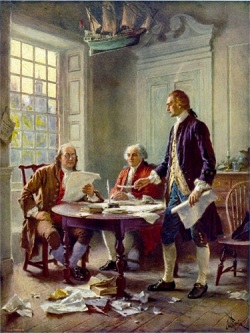 My last Op-Ed (below) spawned a counter-post over on the Old VA Blog. This rebuttal presents the concept of ‘unalienable rights,’ and argues that American Exceptionalism is valid because the Founding Fathers believed that our rights come from God, not Kings, nor governments, nor Congress nor the President, none of which have the moral authority to grant rights; they can only acknowledge them.
My last Op-Ed (below) spawned a counter-post over on the Old VA Blog. This rebuttal presents the concept of ‘unalienable rights,’ and argues that American Exceptionalism is valid because the Founding Fathers believed that our rights come from God, not Kings, nor governments, nor Congress nor the President, none of which have the moral authority to grant rights; they can only acknowledge them.
The phrase “that they [all men] are endowed by their Creator with certain unalienable Rights” from the Declaration of Independence was used as the basis for this theory. It is an assumption that has been debated by historians and philosophers alike for generations.
Ironically, I am in the process of finishing up a brilliant study of the Declaration by Pauline Maier titled American Scripture: Making the Declaration of Independence. Among its revelations is the fact that the document was anything but visionary. According to Maier’s findings, ninety such declarations were already issued throughout the Thirteen Colonies from April to July 1776. Her book also does a wonderful job of reminding us that Declaration is a secular, man-made document - extraordinary in its own right - but not a religious dogma or scripture.
According to the counter-post I referenced above, the use of term ‘unalienable rights’ by the Founders was a deliberate choice that affirms American Exceptionalism: “It means that those rights are incapable of being surrendered or taken away - basic rights which the Founders believed [and correctly so] preexisted any government.” Remember, their argument is that God alone gave us our rights and the Founders used this as a primary point when declaring our separation from England.
This is a fine interpretation. However, I take issue with the specific assertion that the Founding Fathers used the concept of divinized ‘rights’ as the basis for our nation’s independence. The exact phrase used was: “One item which often gets overlooked in what makes America exceptional is how the Founders viewed rights…specifically, that our rights come from God.”The truth is that the reference to “their Creator” bestowing any rights on the nation’s citizenry was not even part of the original draft. In fact, it wasn’t even inserted into the Declaration of Independence until the very end. Unfortunately the original draft of the proclamation no longer exists, but a compilation has been reconstructed from various copies that do. Here is the evolution of the phrase in question:
Jefferson’s original states: “We hold these truths to be sacred and undeniable, that all men are created equal and independent; that from that equal creation they derive in rights inherent and unalienables, among which are the preservation of life, and liberty and the pursuit of happiness; . . .”
In the John Adams copy, written, sometime between June 11 and June 28, in his own (J. Adams) handwriting we have the following: “We hold these truths to be self evident, that all men are created equal and independent; that from that equal creation they derive in rights inherent and unalienables, among which are the preservation of life, and liberty and the pursuit of happiness; . . .”
Before being submitted to Congress, the above section was changed to the following: “We hold these truths to be self-evident, that all men are created equal, that they are endowed by their Creator with certain unalienable Rights, that among these are Life, Liberty and the pursuit of Happiness. . . .”
Note the underlined addition of the phrase “endowed by their Creator”. Though many other changes were made in the rest of the document, Congress accepted those lines for the finished Declaration.
So…the question remains, does this statement support American Exceptionalism? I say no. First off, this entire concept was anything but a uniquely “American ideal.” The 17th-century English, philosopher John Locke and the Irish philosopher Francis Hutcheson both presented the theory of natural law and unalienable rights prior to the Founders. Second, and perhaps most telling of all, is the fact that the Founders themselves were not unanimous in support of this theory.
Thomas Jefferson, the very author of the Declaration, added that additional verbiage only at the insistence of his fellow committee members. His friend James Madison, author of the U.S. Constitution, believed that there were social rights, arising neither from natural law nor from positive law (which are the basis of natural and legal rights respectively) but from the social contract from which a government derives its authority.
In other words Madison believed that society endows these rights upon themselves in order to maintain a civilized and prosperous culture. This power comes for The People, by The People. That’s not at all a divine intervention which was the entire basis for the pro-AE crowd’s counterpoint. So although I agree with the premise that the Declaration of Independence is an exceptional document, I do not believe that its language alone affirms American Exceptionalism.
We often forget the U.S. Constitutional Convention of 1787, where the Founders gathered in Philadelphia to argue and debate about what rights and responsibilities should be included in the constitution. After three years of heavy argument, negotiation, compromise and salesmanship, the 13 states voted on the constitution, and the rights and responsibilities within it became law. This reinforces the idea that the concept of rights (regardless of origin) was an extremely complex and controversial subject, even to the men who established them.
Updated: Monday, 12 December 2011 11:23 AM EST
Permalink | Share This Post





